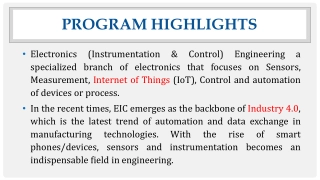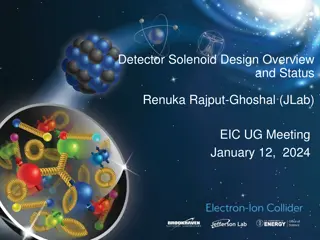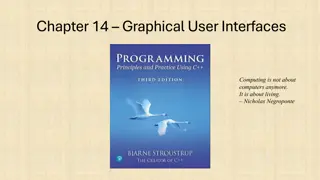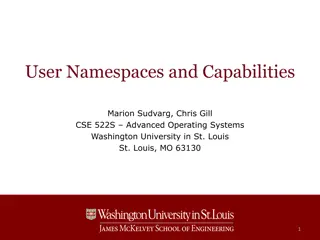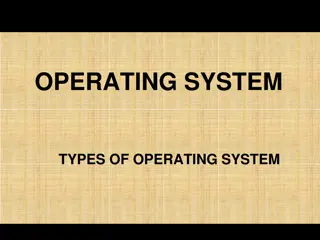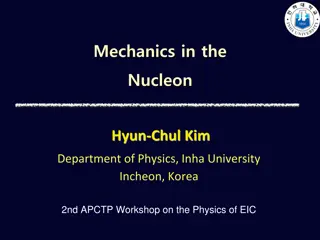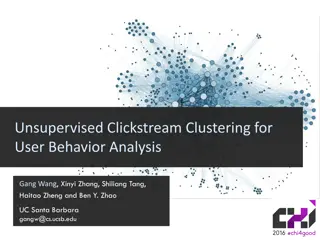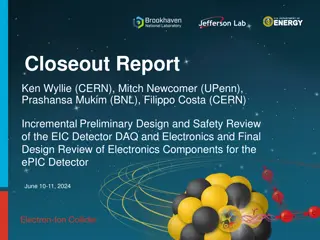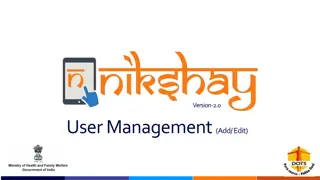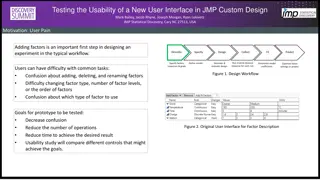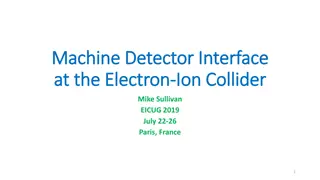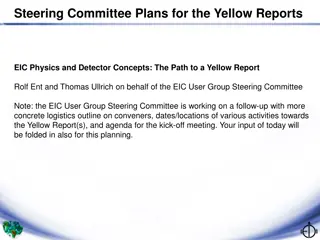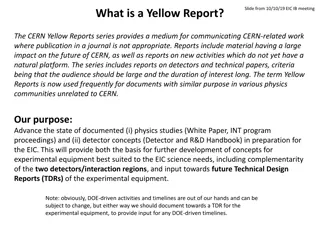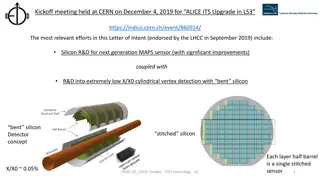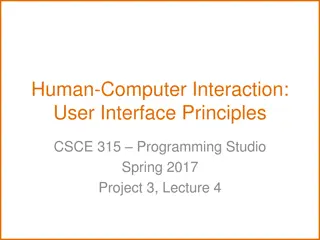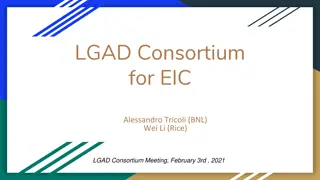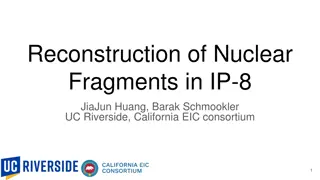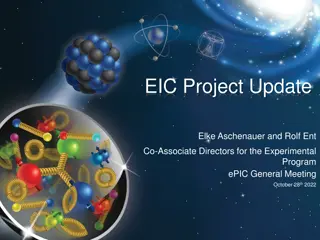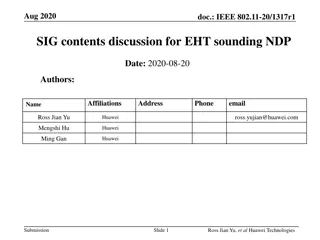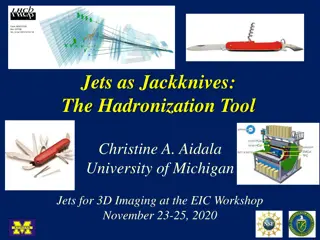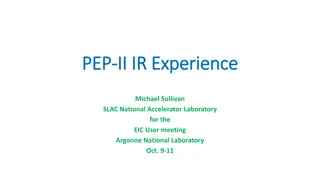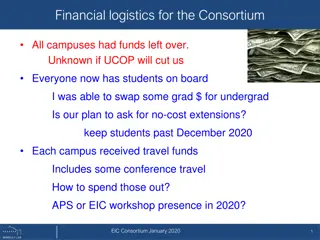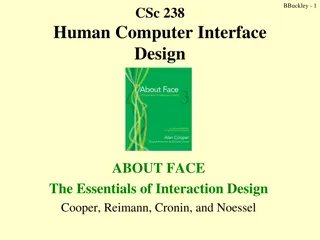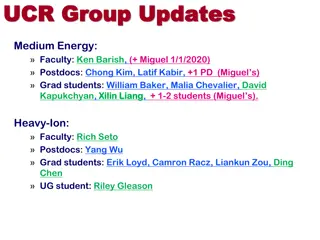Career Opportunities in Electronics Instrumentation & Control Engineering
Electronics Instrumentation & Control (EIC) Engineering is a specialized branch focusing on sensors, IoT, control, and automation. It plays a crucial role in Industry 4.0 and offers diverse career paths in fields like smart systems, biomedical, and industrial automation. The program at TIET boasts e
0 views • 13 slides
Maximizing Impact: The Role of Rich Snippets in SERPs"User Intent
User intent, also known as search intent, refers to the underlying goal or purpose a user has when performing an online search. It goes beyond the literal interpretation of keywords and focuses on understanding why a person is searching. Recognizing and catering to user intent is crucial for creatin
3 views • 10 slides
Operating Systems
An operating system is a crucial program that manages all other programs on a computer. It handles tasks like input recognition, file management, and device control. There are different types of operating systems such as single-user, single-task systems, multi-user, multi-task systems, real-time ope
6 views • 11 slides
Detector Solenoid Design Overview and Status Update for EIC UG Meeting
Overview of the detector solenoid design presented by Renuka Rajput-Ghoshal from JLab at the EIC UG Meeting. The presentation covers the team members, collaboration process, timeline, and milestones achieved in the design and procurement phases.
0 views • 26 slides
Advanced Microbunched Electron Cooling for EIC Design Overview
Microbunched electron cooling is a cutting-edge technique proposed for the Electron-Ion Collider (EIC) design, aimed at enhancing beam properties through coherent electron interactions. The concept utilizes Coherent Electron Cooling (CeC) and broad-band amplification in the form of Micro-bunched Ele
1 views • 16 slides
The Evolution of Graphical User Interfaces in Computing
Graphical User Interfaces (GUIs) have transformed computing into a more user-friendly and interactive experience, emphasizing the shift from technology-focused to human-centric living. This chapter delves into the various aspects of GUIs, including I/O alternatives, common GUI tasks, programming per
1 views • 32 slides
Understanding Linux User Capabilities and Namespace Management
Linux user namespaces and capabilities play a critical role in managing system security and permissions. Users and groups are assigned unique IDs, and processes are associated with the user's ID. The kernel enforces permission checks based on user IDs and group IDs, allowing root access to bypass ce
0 views • 14 slides
Understanding Heuristic Evaluation in User Interface Design
Heuristic evaluation is an analytical method where experts evaluate interfaces based on usability principles. This evaluation helps in identifying potential design issues that may impact user satisfaction. The process involves a small group of evaluators reviewing the interface against a set of reco
5 views • 12 slides
Understanding Different Types of Operating Systems
An operating system is the crucial program that manages a computer's resources and acts as an interface between the user and the machine. Various types of operating systems exist, including real-time, multi-user vs. single-user, multi-tasking vs. single-tasking, distributed, and embedded systems. Re
1 views • 11 slides
Implementing Alert Messages and User Input Handling in Java
This tutorial guides you through creating alert messages, handling user input, defining functions, calling functions from the `onCreate` method, and creating an XML file for user data entry validation in Java. Learn how to display alerts for empty user credentials and process user actions accordingl
1 views • 6 slides
Understanding Nucleon Structure: Insights from EIC Workshop
Exploring the mechanics of nucleons and the physics goals of the Electron-Ion Collider (EIC), this content delves into the origin of nucleon mass and spin, emergent properties of dense gluon systems, and energy-momentum tensor in QCD. It discusses the role of gluons in understanding nucleon structur
0 views • 31 slides
Unsupervised Clickstream Clustering for User Behavior Analysis
Understanding user behavior in online services is crucial for businesses. This research focuses on utilizing clickstream data to identify natural clusters of user behavior and extract meaningful insights at scale. By analyzing detailed user logs, the study aims to reveal hidden patterns in user inte
0 views • 19 slides
Closeout Report: Incremental Design Review of EIC Detector Electronics
Closeout report detailing the progress of the Incremental Preliminary Design and Safety Review of the EIC Detector DAQ and Electronics, along with the Final Design Review of Electronics Components for the ePIC Detector. The report includes responses to charge questions, panel reviews, comments, reco
0 views • 23 slides
Domain-Specific Visual Analytics Systems: Exploring Expert User Insights
This presentation delves into domain-specific visual analytics systems focusing on political simulation, wire fraud detection, bridge maintenance, and more. It emphasizes leveraging user expertise for effective system design and evaluation, highlighting the importance of user insights in data analys
0 views • 27 slides
Efficient User Management System for Health Facilities
Record and manage user details effectively with the new Version 2.0 User Management feature. RNTCP has now registered over 35,000 PHIs, 140,000 Private Health Facilities, 15,000 Private Labs, 31,000 Private Chemists, across 700 Districts and 8,000 TUs in Nikshay. Enhance operations by editing TU pro
0 views • 26 slides
User Roles and Responsibilities Overview
The user roles within the application are categorized into Account Manager, Data Steward, and Common Functionality roles. Each role comes with specific responsibilities such as managing user accounts, database management, data stewardship, incident management, and more. Non-privileged roles provide
0 views • 11 slides
Understanding Agile User Stories in Software Development
Agile user stories play a crucial role in software development by providing short descriptions of features desired by customers in a language they understand. This method allows for agile planning, efficient documentation, and effective communication between development teams and clients. Extracting
0 views • 30 slides
Exploring Usability Testing of New Interface in JMP Custom Design
In this study by Mark Bailey et al. from JMP Statistical Discovery in the USA, the focus lies on testing the usability of a new user interface using JMP Custom Design. The researchers highlight the significance of adding factors in the initial experiment design workflow to enhance user experience. U
0 views • 8 slides
Enhancing User Experience Through Data Trails and Metrics
Andrea Thompson, a Sr. User Experience Manager at The Home Depot, highlights the importance of measuring and analyzing user experience metrics to understand and improve customer interactions. By investigating data trails from various touchpoints, such as customer sign-ups, interactions with associat
0 views • 17 slides
South East England General Histopathology EQA Scheme Meeting
The South East England General Histopathology EQA Scheme meeting on Tuesday, 30th July 2024, is set to discuss cases, review scores, and address questions. The meeting will cover meeting etiquette, agenda topics, meeting terms of reference, and round Y review. Attendees are reminded of the education
1 views • 20 slides
Challenges and Considerations in Electron-Ion Collider Detector Development
Exploring the development of detector systems for Electron-Ion Colliders (EIC) involves addressing various issues such as detector acceptance for low Q2 and high Q2, unique beam characteristics, and the need for specialized components like bend magnets and polarimeters. Key considerations include po
0 views • 16 slides
EIC User Group Steering Committee Plans for Yellow Reports on Physics and Detector Concepts
The EIC User Group Steering Committee is focused on developing Yellow Reports to communicate important physics studies and detector concepts for the Electron-Ion Collider (EIC). These reports aim to advance experimental equipment concepts, complementarity of detectors, and provide input for future T
0 views • 9 slides
Communication Strategies and Reports for Advancing Physics Studies and Detector Concepts at EIC
CERN Yellow Reports provide a platform for sharing impactful work related to CERN, including reports on detectors, technical papers, and new activities. The goal is to advance physics studies and detector concepts in preparation for the EIC, focusing on quantifying physics measurements, implications
0 views • 10 slides
Update on ALICE ITS Upgrade Efforts at CERN
Kickoff meeting for the ALICE ITS Upgrade in LS3 was held at CERN on December 4, 2019. The efforts focus on silicon R&D for next-gen MAPS sensor with improvements, low X/X0 cylindrical vertex detection, and a new sensor design. Milestones, organization of efforts, and future plans towards an EIC sil
0 views • 6 slides
State Accounting Business User Group (BUG) Meeting Details
Event details and agenda for the State Accounting Business User Group (BUG) meeting scheduled for Tuesday, February 25, 2020. The meeting will cover various topics such as general announcements, W4 updates, feedback forms, OCIO IBTs, batch error status, and more. Attendees will receive information o
0 views • 51 slides
User Interface Design Principles in Human-Computer Interaction
User interface design principles are crucial in Human-Computer Interaction. This content highlights key principles such as aesthetics, anticipation, autonomy, and color consideration for users with color blindness. It emphasizes the importance of user testing, user autonomy, and providing essential
0 views • 24 slides
LGAD Consortium for EIC: Advancing Detector Technologies
The LGAD Consortium aims to foster the development of detector technologies based on LGAD sensors for the Electron-Ion Collider (EIC) and future projects. By creating a collaborative effort, sharing expertise, and bringing together those interested in LGAD-based detectors, the consortium seeks to ad
0 views • 9 slides
Reconstruction of Nuclear Fragments in EIC e-A Collisions
Investigating nuclear fragment production in EIC e-A collisions through modeling scattering and decay processes using event generators like BeAGLE and FLUKA. Focus is on reconstructing pre-fragments based on nuclei and escaped nucleons, with detectors in far-forward regions aiding in trajectory and
0 views • 22 slides
Understanding Interaction Design in Human-Computer Interaction
Interaction design focuses on creating interactive products that are easy, effective, and enjoyable to use. It aims to reduce negative user experiences while enhancing positive ones. Designing interactive products requires understanding user activities, interfaces, and device arrangements to support
0 views • 11 slides
Update on Recent Events and Meetings at the EIC Project
Highlights include the appointment of Elke Aschenauer and Rolf Ent as Co-Associate Directors for the Experimental Program, discussions and preparations for upcoming meetings such as the Resource Review Board kickoff and the Detector Advisory Committee, as well as key updates on project progress and
0 views • 21 slides
IEEE 802.11-20/1317r1 EHT-SIG Proposal Discussion
The document discusses EHT-SIG for single-user and sounding NDP in IEEE 802.11-20/1317r1, focusing on overflow bits, user fields, CRC, and tail formats. It covers the format details, subfields, and overhead compared to HE sounding, proposing specific bit allocations for different elements. The EHT-S
0 views • 16 slides
Solutions to Plastic Pollution: Taking Action for a Sustainable Future
The KazakhExport EIC JSC is committed to sustainable development by addressing plastic pollution through global initiatives. Plastic waste poses a threat to ecosystems and human health due to its long decomposition period. Implementing regulations at the production level and promoting ecodesign can
0 views • 11 slides
Exploring the Versatility of Jets in Hadronization and 3D Imaging at EIC Workshop
Versatile tools in the field of physics, jets play a crucial role in hadronization and 3D imaging. Recent advancements, such as the anti-kT jet reconstruction algorithm, have enhanced the robustness of jet comparisons between theory and experiments. This progress has led to various possibilities lik
0 views • 59 slides
A Closer Look at PEP-II IR Experience and Beam Parameters
Dive into the details of PEP-II IR layout, beam parameters, and differences/similarities with other accelerator designs like JLEIC and eRHIC. Explore topics such as beam-gas interactions, radiative Bhabhas, and detector acceptance angles, presented at the EIC User Meeting.
0 views • 18 slides
Administrator Deletes User - User Management System Storyboard
An administrator navigates through a user list, selects a user for deletion, confirms the action, and successfully removes the user from the system. The process involves interacting with user details, confirming the deletion, and updating the user list accordingly in a structured manner.
0 views • 4 slides
Financial Logistics and Research Goals for EIC Consortium
The Consortium campuses have excess funds and are uncertain about potential budget cuts. Strategies are being discussed on utilizing the remaining funds effectively, including extending student presence and organizing workshops. The personnel roster includes recent additions, collaborations, and rec
0 views • 9 slides
Efficient Collaboration Workflow for EIC Software Development
Establishing a critical path for EIC software development, the Software and Computing WG aims for a unified approach. Key tasks include assessing software solutions, proposing recommendations guided by principles, and transitioning to the official framework by October. The procedure outlines a struc
0 views • 13 slides
User Interface vs User Experience: Understanding the Essentials
Exploring the distinctions between User Interface (UI) and User Experience (UX) in human-computer interaction design. UI focuses on the space of interaction between humans and machines, while UX encompasses users' behavior, attitude, and emotions towards a product or service. The goal is to create i
0 views • 63 slides
Updates on UCR Group Medium Energy and STAR Forward Upgrade
UCR Group has updates on faculty, postdocs, grad students, and ongoing projects in Medium Energy and Heavy-Ion domains. The STAR Forward Upgrade focuses on Calorimeter System R&D for EIC Detector. TMDs research at STAR is advancing with data on higher x values and Q2 at 100 GeV2. Initial State of Nu
0 views • 4 slides
Understanding Context Switching and User-Kernel Interaction in Operating Systems
Context switching in operating systems involves a seamless transition between user-level threads without the kernel's awareness. User-level code manages register state and stack pointers, while user-kernel mode switching requires changing processor privilege levels and agreement on information excha
0 views • 25 slides
